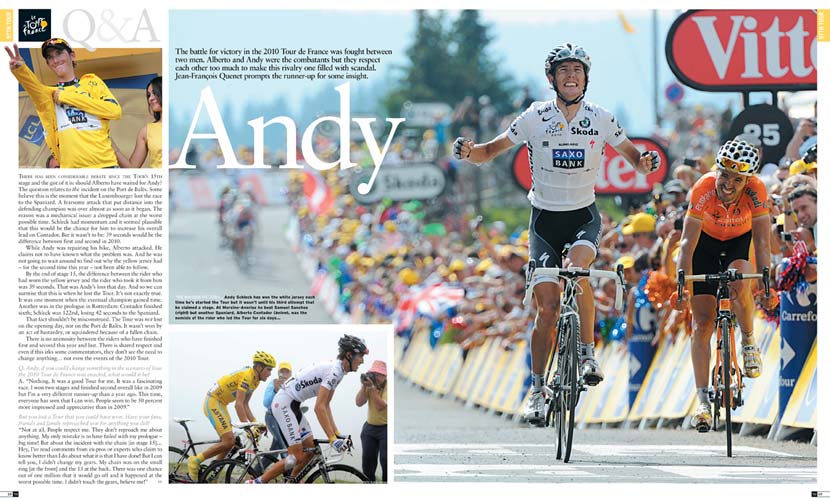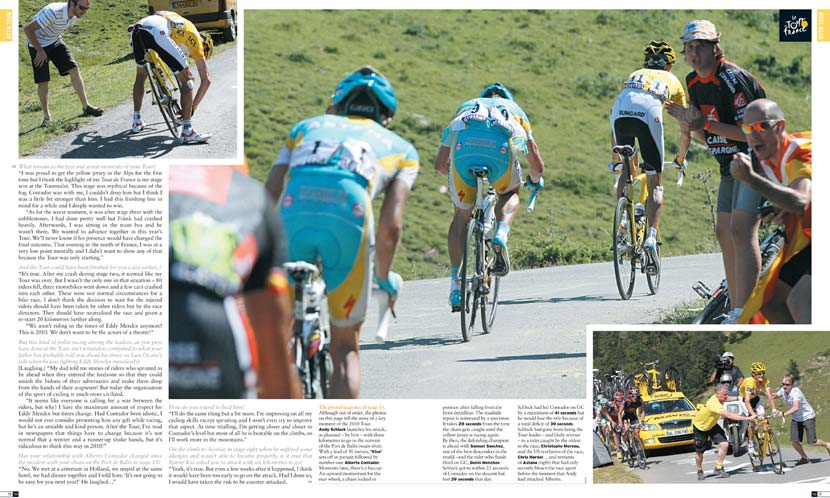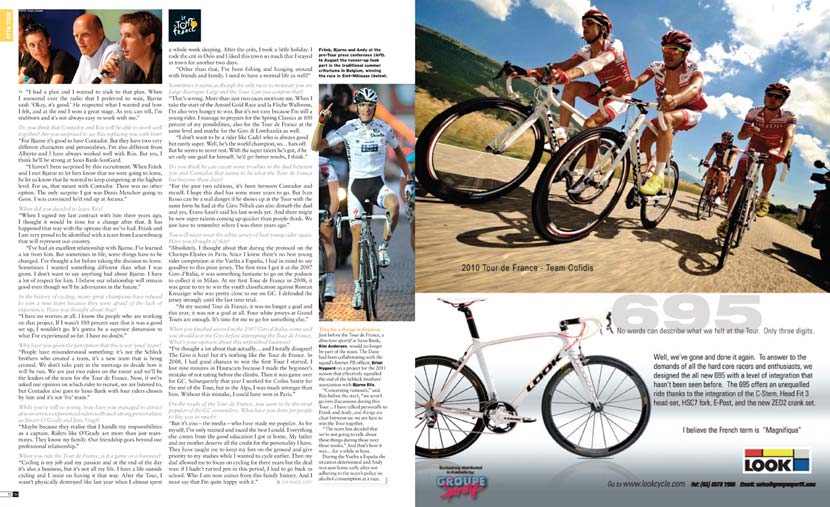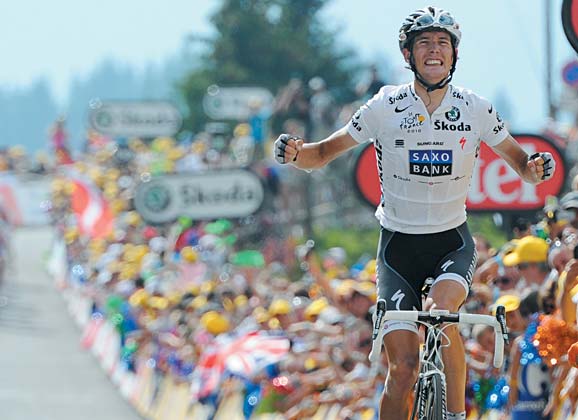On Thursday, 9 October 2014, Andy Schleck sat down at a press conference and explained that he will no longer be a professional cyclist. He is 29 years old.
He first raced as a professional at the age of 19. He finished second overall in his first Giro d’Italia (2007). He won the white jersey in his first Tour de France (2008). He would win the youth classification another two times at the Tour (2009 and 2010). He was the runner-up in the 2009, 2010, and 2011 Tours de France. And he was retrospectively awarded the victory of the 97th Tour de France (2010) because Alberto Contador tested positive to clenbuterol.
Many stories have come from a career that was cut in half by injury. Ultimately, he cited a knee problem sustained in a crash during his final Tour de France (2014) as the catalyst for a difficult decision. He would stop competing even though he had the support of the Trek Factory Racing team.
The final years of his competitive career yielded little success. It was one battle after another for the Luxembourger. But that’s not what he should be remembered for. Instead, his legacy should be how he made cycling exciting thanks to his exploits during what should have been formative years. He is a gentleman of the sport.
A day after his retirement announcement, we take a moment to look back on some highlights of his career. Below is a feature published in RIDE #50 (2010) at a time when he was still officially the runner-up of the his third Tour de France. That race featured the famous dropped chain incident on the Port de Balès. Immediately after the 15th stage, when he lost 39 seconds to Contador because of a mechanical incident – the same margin that he would ultimately be beaten by Contador by in the three-week contest – he spoke to various media. Click the link below to listen to how he explained the day… and then remember one of the more interesting Tours by reading the interview Jean-François Quenet did with him in 2010.
Andy Schleck Q&A: Tour de France 2010
– By Jean-François Quenet
The battle for victory in the 2010 Tour de France was fought between two men. Alberto and Andy were the combatants but they respect each other too much to make this rivalry one filled with scandal.
Jean-François Quenet prompts the runner-up for some insight.

From RIDE #50 (2010).
There has been considerable debate since the Tour’s 15th stage and the gist of it is: should Alberto have waited for Andy? The question relates to the incident on the Port de Balès. Some believe this is the moment that the Luxembourger lost the race to the Spaniard. A fearsome attack that put distance into the defending champion was over almost as soon as it began. The reason was a mechanical issue: a dropped chain at the worst possible time. Schleck had momentum and it seemed plausible that this would be the chance for him to increase his overall lead on Contador. But it wasn’t to be: 39 seconds would be the difference between first and second in 2010.
While Andy was repairing his bike, Alberto attacked. He claims not to have known what the problem was. And he was not going to wait around to find out why the yellow jersey had – for the second time this year – not been able to follow.
By the end of stage 15, the difference between the rider who had worn the yellow jersey and the rider who took it from him was 39 seconds. That was Andy’s loss that day. And so we can surmise that this is when he lost the Tour. It’s not exactly true. It was one moment when the eventual [temporary] champion gained time. Another was in the prologue in Rotterdam: Contador finished sixth; Schleck was 122nd, losing 42 seconds to the Spaniard.
That fact shouldn’t be misconstrued. The Tour was not lost on the opening day, nor on the Port de Balès. It wasn’t won by an act of bastardry, or squandered because of a fallen chain.
There is no animosity between the riders who have finished first and second this year [2010] and last [2009]. There is shared respect and even if this irks some commentators, they don’t see the need to change anything… not even the events of the 2010 Tour.
RIDE: Andy, if you could change something in the scenario of how the 2010 Tour de France was enacted, what would it be?
Andy Schleck: “Nothing. It was a good Tour for me. It was a fascinating race. I won two stages and finished second overall like in 2009 but I’m a very different runner-up than a year ago. This time, everyone has seen that I can win. People seem to be 50 percent more impressed and appreciative than in 2009.”
But you lost a Tour that you could have won. Have your fans, friends and family reproached you for anything you did?
“Not at all. People respect me. They don’t reproach me about anything. My only mistake is to have failed with my prologue – big time! But about the incident with the chain [in stage 15]… Hey, I’ve read comments from ex-pros or experts who claim to know better than I do about what it is that I have done! But I can tell you, I didn’t change my gears. My chain was on the small ring [at the front] and the 13 at the back. There was one chance out of one million that it would go off and it happened at the worst possible time. I didn’t touch the gears, believe me!”

The pivotal sequence of stage 15 (top photo). Although out of order, the photos on this page tell the story of a key moment of the 2010 Tour.
Andy Schleck launches his attack, as planned – by him – with three kilometres to go to the summit of the Port de Balès (main photo). With a lead of 50 metres, ‘Vino’ sets off in pursuit followed by number-one Alberto Contador.
Moments later, there’s a hiccup. An upward momentum for the rear wheel, a chain locked in position after falling from the front derailleur. The roadside repair is witnessed by a spectator. It takes 28 seconds from the time the chain gets caught until the yellow jersey is racing again.
By then, the defending champion is ahead with Samuel Sanchez, one of the best descenders in the world –and the rider who finish third on GC, Denis Menchov.
Schleck got to within 22 seconds of Contador on the descent but lost 39 seconds that day.
Schleck had led Contador on GC by a maximum of 41 seconds but he would lose the title because of a total deficit of 39 seconds.
Schleck had gone from being the Tour leader – and likely winner – to a rider caught by the oldest in the race, Christophe Moreau, and the US revelation of the race, Chris Horner… and remants of Astana (bottom photo) that had only recently blown the race apart before the moment that Andy
had attacked Alberto.
What remain as the best and worst moments of your Tour?
“I was proud to get the yellow jersey in the Alps for the first time but I think the highlight of my Tour de France is my stage win at the Tourmalet. This stage was mythical because of the fog. Contador was with me, I couldn’t drop him but I think I was a little bit stronger than him. I had this finishing line in mind for a while and I deeply wanted to win.
“As for the worst moment, it was after stage three with the cobblestones. I had done pretty well but Fränk had crashed heavily. Afterwards, I was sitting in the team bus and he wasn’t there. We wanted to advance together in this year’s Tour. We’ll never know if his presence would have changed the final outcome. That evening in the north of France, I was at a very low point mentally and I didn’t want to show any of that because the Tour was only starting.”
And the Tour could have been finished for you a day earlier..!
“It’s true. After my crash during stage two, it seemed like my Tour was over. But I wasn’t the only one in that situation – 80 riders fell, three motorbikes went down and a few cars crashed into each other. These were not normal circumstances for a bike race. I don’t think the decision to wait for the injured riders should have been taken by other riders but by the race directors. They should have neutralised the race and given a re-start 20 kilometres further along.
“We aren’t riding in the times of Eddy Merckx anymore! This is 2010. We don’t want to be the actors of a theatre!”
But this kind of polite racing among the leaders, as you guys have done at the Tour, isn’t it tasteless compared to what your father has probably told you about his times on Luis Ocaña’s side when he was fighting Eddy Merckx mercilessly?
[Laughing.] “My dad told me stories of riders who sprinted to be ahead when they entered the feedzone so that they could smash the bidons of their adversaries and make them drop from the hands of their soigneurs! But today the organisation of the sport of cycling is much more civilized.
“It seems like everyone is calling for a war between the riders, but why? I have the maximum amount of respect for Eddy Merckx but times change. Had Contador been idiotic, I would not ever consider presenting him any gift while racing, but he’s an amiable and kind person. After the Tour, I’ve read in newspapers that things have to change because it’s not normal that a winner and a runner-up shake hands, but it’s ridiculous to think this way in 2010!”
Has your relationship with Alberto Contador changed since the incident with your chain on the Port de Balès in stage 15?
“No. We met at a criterium in Holland, we stayed at the same hotel, we had dinner together and I told him: ‘It’s not going to be easy for you next year!’ He laughed…”

From RIDE #50 (2010).
Time for a change in direction. Just before the Tour de France, a directeur sportif at Saxo Bank, Kim Andersen, would no longer be part of the team. The Dane had been collaborating with the squad’s former PR officer, Brian Nygaard on a project for the 2011 season that effectively signalled the end of the Schleck brothers’ association with Bjarne Riis.
“Concerning rumours,” said Riis before the start, “we won’t go into discussions during this Tour… I have talked personally to Fränk and Andy, and things are clear between us: we are here to win the Tour together.
“The team has decided that we’re not going to talk about these things during these next three weeks.” And that’s how it was… for a while at least.
During the Vuelta a España the situation deteriorated and Andy was sent home early after not adhering to the team’s policy on alcohol consumption at a race.
How do you intend to beat him?
“I’ll do the same thing but a bit more. I’m improving on all my cycling skills except sprinting and I won’t even try to improve that aspect. At time trialling, I’m getting closer and closer to Contador’s level but most of all he is beatable on the climbs, so I’ll work more in the mountains.”
On the climb to Avoriaz in stage eight when he suffered some allergies and wasn’t able to breathe properly, is it true that Bjarne Riis asked you to attack with six kilometres to go?
“Yeah, it’s true. But even a few weeks after it happened, I think it would have been too early to go on the attack. Had I done so, I would have taken the risk to be counter-attacked.
“I had a plan and I wanted to stick to that plan. When I answered over the radio that I preferred to wait, Bjarne said: ‘Okay, it’s good.’ He respected what I wanted and how I felt, and at the end I won a great stage. As you can tell, I’m stubborn and it’s not always easy to work with me.”
Do you think that Contador and Riis will be able to work well together? Are you surprised to see Riis replacing you with him?
“For Bjarne it’s good to have Contador. But they have two very different characters and personalities. I’m also different from Alberto and I have always worked well with Riis. But yes, I think he’ll be strong at Saxo Bank-SunGard.
“I haven’t been surprised by this recruitment. When Fränk and I met Bjarne to let him know that we were going to leave, he let us know that he wanted to keep competing at the highest level. For us, that meant with Contador. There was no other option. The only surprise I got was Denis Menchov going to Geox. I was convinced he’d end up at Astana.”
When did you decided to leave Riis?
“When I signed my last contract with him three years ago, I thought it would be time for a change after that. It has happened that way with the options that we’ve had. Fränk and I are very proud to be identified with a team from Luxembourg that will represent our country.
“I’ve had an excellent relationship with Bjarne. I’ve learned a lot from him. But sometimes in life, some things have to be changed. I’ve thought a lot before taking the decision to leave. Sometimes I wanted something different than what I was given. I don’t want to say anything bad about Bjarne. I have a lot of respect for him. I believe our relationship will remain good even though we’ll be adversaries in the future.”
In the history of cycling, many great champions have refused to join a new team because they were afraid of the lack of experience. Have you thought about that?
“I have no worries at all. I know the people who are working on that project. If I wasn’t 100 percent sure that it was a good set up, I wouldn’t go. It’s gonna be a superior dimension to what I’ve experienced so far. I have no doubt.”
Why have you given the perception that this is not ‘your’ team?
“People have misunderstood something: it’s not the Schleck brothers who created a team, it’s a new team that is being created. We don’t take part in the meetings to decide how it will be run. We are just two riders on the roster and we’ll be the leaders of the team for the Tour de France. Now, if we’re asked our opinion on which rider to recruit, we are listened to, but Contador also goes to Saxo Bank with four riders chosen by him and it’s not ‘his’ team.”
While you’re still so young, how have you managed to attract at your service experienced riders with such strong personalities as Stuart O’Grady and Jens Voigt?
“Maybe because they realise that I handle my responsibilities as a captain. Riders like O’Grady are more than just team-mates. They know my family. Our friendship goes beyond our professional relationship.”
When you ride the Tour de France, is it a game or a business?
“Cycling is my job and my passion and at the end of the day it’s also a business, but it’s not all my life. I have a life outside cycling and I insist on having it that way. After the Tour, I wasn’t physically destroyed like last year when I almost spent a whole week sleeping. After the crits, I took a little holiday. I rode the crit in Oslo and I liked this town so much that I stayed in town for another two days.
“Other than that, I’ve been fishing and hanging around with friends and family. I need to have a normal life as well!”
Sometimes it seems as though the only races to motivate you are Liège-Bastogne-Liège and the Tour. Can you confirm that?
“That’s wrong. More than just two races motivate me. When I take the start of the Amstel Gold Race and la Flèche Wallonne, I’m also very hungry to win. But it’s not easy because I’m still a young rider. I manage to prepare for the Spring Classics at 100 percent of my possibilities, also for the Tour de France at the same level and maybe for the Giro di Lombardia as well.
“I don’t want to be a rider like Cadel who is always good but rarely super. Well, he’s the world champion, so… hats off. But he seems to never rest. With the super talent he’s got, if he set only one goal for himself, he’d get better results, I think.”
Do you think he can create some troubles in the duel between you and Contador that seems to be what the Tour de France has become these days?
“For the past two editions, it’s been between Contador and myself. I hope this duel has some more years to go. But Ivan Basso can be a real danger if he shows up at the Tour with the same form he had at the Giro. Nibali can also disturb the duel and yes, Evans hasn’t said his last words yet. And there might be new super talents coming up quicker than people think. We just have to remember where I was three years ago.”
You will never wear the white jersey of best young rider again. Have you thought of that?
“Absolutely. I thought about that during the protocol on the Champs-Elysées in Paris. Since I knew there’s no best young rider competition at the Vuelta a España, I had in mind to say goodbye to this prize jersey. The first time I got it at the 2007 Giro d’Italia, it was something fantastic to go on the podium to collect it in Milan. At my first Tour de France in 2008, it was great to try to win the youth classification against Roman Kreuziger who was pretty close to me on GC. I defended the jersey strongly until the last time trial.
“At my second Tour de France, it was no longer a goal and this year, it was not a goal at all. Four white jerseys at Grand Tours are enough. It’s time for me to go for something else.”
When you finished second in the 2007 Giro d’Italia, some said you should win the Giro before attempting the Tour de France. What’s your opinion about this unfinished business?
“I’ve thought a lot about that actually… and I totally disagree! The Giro is hard but it’s nothing like the Tour de France. In 2008, I had good chances to win the first Tour I started. I lost nine minutes in Hautacam because I made the beginner’s mistake of not eating before the climbs. Then it was game over for GC. Subsequently that year I worked for Carlos Sastre for the rest of the Tour, but in the Alps, I was much stronger than him. Without this mistake, I could have won in Paris.”
On the roads of the Tour de France, you seem to be the most popular of the GC contenders. What have you done for people to like you so much?
“But it’s you – the media – who have made me popular. As for myself, I’ve only trained and raced the best I could. Everything else comes from the good education I got at home. My father and my mother deserve all the credit for the personality I have. They have taught me to keep my feet on the ground and give priority to my studies while I wanted to cycle earlier. Then my dad allowed me to focus on cycling for three years but the deal was: if I hadn’t turned pro in this period, I had to go back to school. Who I am now comes from this family history. And I must say that I’m quite happy with it.”
– Interview by Jean-François Quenet



